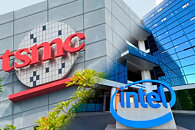Wednesday, March 24th 2021

Intel to Outsource a Part of 2023 Processor Production to TSMC
Intel's problems with processor production, especially with newer nodes like 10 nm and 7 nm, have been widely known. The company has not been able to deliver the latest semiconductor process on time and has thus delayed many product launches. However, things are looking to take a complete U-turn and the hell will freeze. During the "Intel Unleashed: Engineering the Future" webcast event that happened yesterday, the company made several announcements regarding the 7 nm process and its viability. We have already reported that the company is working on the new Meteor Lake processor lineup for 2023, supposed to be manufactured on the fixed 7 nm node.
However, it seems like Intel will have to tap external capacities to manufacture a part of its processor production. The company has confirmed that it will use an unknown TSMC process to manufacture a part of the 2023 processor lineup. That means that Intel and TSMC have already established the needed capacity and that TSMC has already booked wafer capacity for Intel. This has never happened before, as Intel always kept its processor production under the company roof. However, given that there is a huge demand for new semiconductor processes, Intel has to look at external manufacturing options to keep up with the demand.
Source:
Tom's Hardware
However, it seems like Intel will have to tap external capacities to manufacture a part of its processor production. The company has confirmed that it will use an unknown TSMC process to manufacture a part of the 2023 processor lineup. That means that Intel and TSMC have already established the needed capacity and that TSMC has already booked wafer capacity for Intel. This has never happened before, as Intel always kept its processor production under the company roof. However, given that there is a huge demand for new semiconductor processes, Intel has to look at external manufacturing options to keep up with the demand.

36 Comments on Intel to Outsource a Part of 2023 Processor Production to TSMC
That 90% is a Pure-play foundry revenue number. There are 2 things to note:
1. This is revenue and sub-10nm is expensive.
2. It does exclude noticeable amounts of sub-10nm chips Samsung and Intel are producing because that is not foundry business.
Edit:
Interesting, the same link from Google search opens without paywall :)
It's almost as if unregulated global commerce creates monopolies, and that this might be problematic. Who could have known?
Also, of course, TSMC and all other sub-10nm lithography is again reliant on a single company for its lithography machinery, so the deeply problematic quasi-monopolies definitely don't end there.
Which is to say that it's no big deal for China ~ just that there's an effin big sea in between & an actual invasion will unlikely be like a bloodless coup. Their only hope to integrate Taiwan is if the rulers actually hand over the key to the kingdom themselves.
Which, of course, is why most superpowers throughout recent history has preferred covert action, like the US propensity to stage coups against democratically elected governments and putting totalitarian dictatorships in their place, or the Soviet propensity for industrial espionage, kidnappings and assassinations. It's just much easier to get away with that kind of stuff. But when conditions are right, authoritarian regimes (and the US does deserve some inclusion in that term) do not shy away from violent intervention - Iraq, Afghanistan, Crimea, Ukraine, and a whole host of other situations in even very recent history demonstrate that clearly.
Oh, and as for that "effin big sea" - it's, what, 100km across? That's really not a lot. Commercial ferries cover distances like that in a few hours; warships could likely do it quite a lot quicker. Heck, that distance could probably be covered with landing craft alone if one wanted a covert approach, even if it would be riskier and slower.